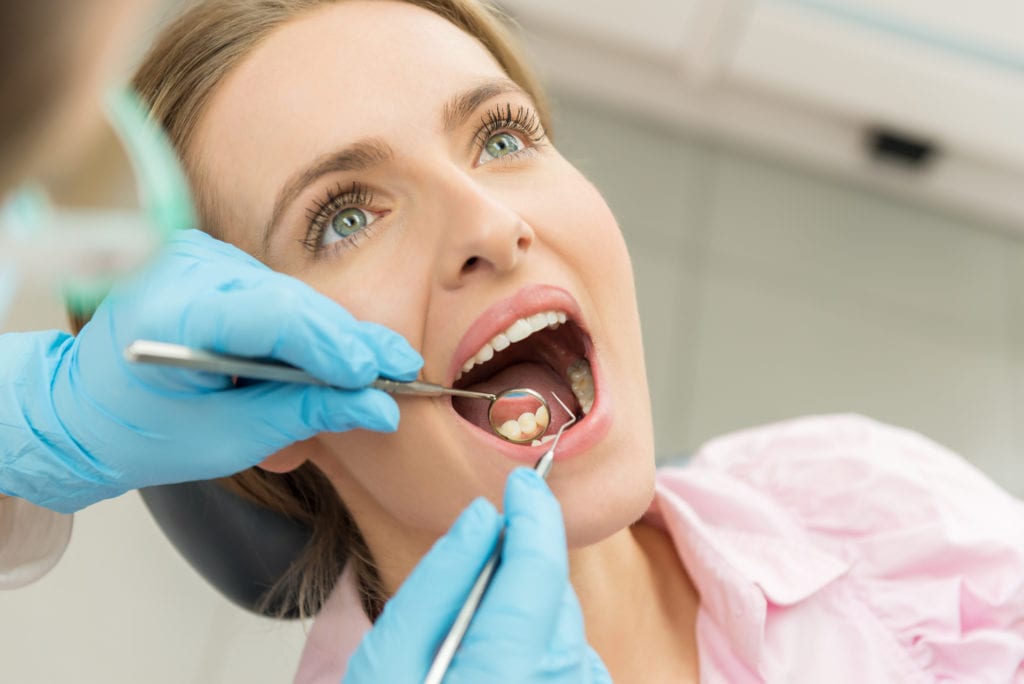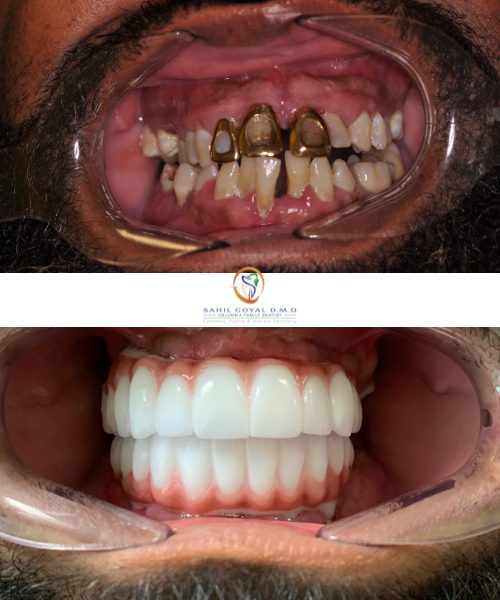Keeping your gums healthy is important for oral health as well as your overall health. Many patients do not realize that poor oral health habits can lead to serious health problems. Gum disease is one of the most serious dental conditions affecting patients of all ages. Gum disease is the leading cause of tooth loss and bone loss.
The disease also has links to multiple other chronic health conditions such as diabetes, heart disease, stroke. Maintaining proper oral health is the best way to avoid gums disease. Dr. Sahil Goyal offers periodontal disease treatment in Frederick, MD for patients who suffer from this dental disease. Visit us to remove your plaque and tartar from your teeth and below the gum line.
Patient Review
The Stages of Gum Disease
Gum disease is a common problem that develops in stages. It starts with mild symptoms and progresses to more severe issues if left untreated. Knowing the stages of gum disease can help people recognize early signs and seek treatment before it worsens.
Stage 1: Gingivitis
The first stage of gum disease is called gingivitis, which is the mildest form and is often easy to treat. Gingivitis is caused by plaque, a sticky film of bacteria that forms on teeth after eating and drinking. If plaque isn’t cleaned off regularly by brushing and flossing, it builds up along the gumline and causes inflammation.
This makes the gums look red, swollen, and sometimes tender. Bleeding gums, especially when brushing or flossing, is a common symptom of gingivitis. Although gingivitis can be uncomfortable, it doesn’t yet cause permanent damage to the bone or supporting structures of the teeth. With good oral hygiene and regular dental cleanings, gingivitis can usually be reversed.
Stage 2: Early Periodontitis
If gingivitis is not treated, it can progress to early periodontitis, the second stage of gum disease. In this stage, plaque hardens into tartar (also called calculus), which is more difficult to remove and builds up below the gumline. The gums pull away from the teeth, forming small pockets where bacteria can collect.
This pocketing and buildup of bacteria lead to infection and damage to the bone that supports the teeth. Symptoms of early periodontitis include more frequent gum bleeding, swelling, and bad breath. The damage at this stage is more serious than gingivitis, and professional dental treatment is often needed to remove the tartar and stop the progression of the disease.
Stage 3: Moderate Periodontitis
In the third stage, moderate periodontitis, the infection deepens and causes more bone loss around the teeth. The pockets between the teeth and gums grow larger, allowing more bacteria to settle in these spaces. As the bone supporting the teeth erodes, teeth may feel loose or shift slightly.
Symptoms in this stage include increased gum sensitivity, pain while chewing, and a noticeable recession of the gums. Moderate periodontitis usually requires more intensive treatments, such as scaling and root planing (deep cleaning) to remove tartar below the gum line and smooth the tooth roots.

Stage 4: Advanced Periodontitis
The final stage, advanced periodontitis, is the most severe and can lead to major health problems. At this stage, the bone and fibers that support the teeth are significantly damaged, causing deep pockets, severe infection, and sometimes pus around the gums. Teeth may become extremely loose and may even need to be removed.
Symptoms at this stage include severe pain, bad breath, and noticeable changes in the position of the teeth. Advanced periodontitis can impact oral and overall health, as the infection can spread to other parts of the body. Treatment for advanced periodontitis may involve surgery, bone grafts, or even tooth extraction.
Gum Disease: Risks and Symptoms
Patients are at a higher risk of developing gum disease because of family history and genetics, smoking or tobacco use. Bad oral hygiene also contributes to the development of gum disease.
Gum disease is a silent disease. Many patients do not experience any obvious signs or symptoms until advanced stages of the disease. Visit the dentist at least twice a year so that we can screen for evidence and provide treatment.
Some of the more common symptoms include:
- Sore gums
- Bleeding gums
- Gum recession
- Loose teeth
- Toothaches
- Bad breath (Halitosis)
- Mouth sores
Treating Gum Disease
Dr. Goyal uses scaling and root planing are procedures in tandem. Scaling removes plaque and calculus (tartar) from beneath the gum tissues. Root planing smooths down the tooth roots so that they can easily reattach to the tooth. Laser dentistry allows our dentists to remove infected gum tissue without pain.
Laser dentistry might sound intimidating, but this method of treatment is comfortable and safe for both patients and dentists. We may prescribe antibacterial rinses and antibiotics to prevent infection from returning after treatment in our office.
We may refer patients who have advanced gum disease to our local periodontist for more intense treatment or surgery. Dr. Goyal will work with the periodontist to create a detailed treatment plan. The plan will treat the gum disease and then restore damaged and lost teeth in our office.
Preventing Gum Disease
Preventing gum disease is about keeping your gums and teeth healthy through simple, everyday habits. Gum disease starts when bacteria build up on your teeth, leading to inflammation, infection, and damage to the bone that holds your teeth in place.
Practice Good Oral Hygiene
The best way to prevent gum disease is to practice good oral hygiene every day. Brushing your teeth twice a day removes the plaque, a sticky layer of bacteria that builds up on your teeth throughout the day. Using fluoride toothpaste is especially helpful because it helps strengthen tooth enamel and keeps bacteria from sticking to your teeth.
Equally important is flossing once daily to reach between teeth where your toothbrush can’t. Plaque can easily hide between teeth and below the gumline, so flossing helps prevent it from turning into tartar, a hardened form of plaque that can only be removed by a dentist. Mouthwash can also be a helpful addition to your routine, as it rinses away leftover particles and bacteria that brushing and flossing might miss.
Visit the Dentist Regularly
Regular dental check-ups and cleanings play a big role in preventing gum disease. During a dental cleaning, your dentist or hygienist removes plaque and tartar from your teeth, especially in areas that are hard to reach at home. They can also check for any early signs of gum disease, like redness or swelling, and provide treatments if needed.
Seeing your dentist every six months is recommended, but some people, especially those at a higher risk of gum disease, may need to visit more often. A professional cleaning can prevent minor problems from becoming serious and catch early gum disease before it progresses.
Avoid Tobacco and Limit Alcohol
Tobacco use is a major risk factor for gum disease. Smoking or chewing tobacco weakens the immune system and makes it harder for your body to fight infections, including those in your gums. People who smoke are also more likely to have plaque buildup and gum recession, which increases the risk of gum disease. Quitting smoking or avoiding tobacco altogether can greatly improve your oral health and reduce your risk of gum problems.
Excessive alcohol consumption can also increase the risk of gum disease. Alcohol can dry out your mouth, which lowers saliva production. Saliva is essential for keeping bacteria in check, so limiting alcohol helps keep your gums healthier.
Eat a Balanced Diet
What you eat affects your gum health as well. A balanced diet rich in vitamins and minerals supports a healthy immune system and helps your gums stay strong. Foods high in vitamin C, like oranges and strawberries, are particularly good for gum health because vitamin C helps repair tissue and reduce inflammation. Crunchy fruits and vegetables, such as apples and carrots, can help clean your teeth as you chew and stimulate your gums, promoting better circulation.
Manage Stress
Stress can make you more likely to clench or grind your teeth, which puts extra pressure on your gums. It also weakens your immune system, making it harder for your body to fight off the bacteria that cause gum disease. Stress-management techniques, like deep breathing, exercise, or meditation, can help keep your gums healthy by reducing the urge to grind and improving your body’s ability to resist infection.

Periodontal Disease Treatment FAQs
Continue reading to get answers to the most frequently-asked questions about gum disease treatment. As a common dental concern that can affect anyone, it is important to learn about this disease. Contact our Frederick dental office if you have additional questions.
Which form of periodontal disease is reversible?
The only reversible stage of periodontal disease is the first stage, gingivitis. Dr. Goyal can reverse gingivitis because the infection has not yet spread to the bone. The most typical symptom during the initial stages is bleeding gums.
What is periodontitis caused by?
The accumulation of plaque and bacteria on the teeth is a leading cause of periodontal condition. Plaque builds up on your teeth everyday which is why brushing multiple times a day and flossing is so important. Periodontal disease symptoms include red, swollen, and bleeding gums that can cause difficulty chewing, pain, and ultimately tooth loss.
How is periodontitis diagnosed?
During a periodontal examination, your dentist or dental hygienist will determine if you have periodontal disease. Your regular dental checkup should always include an examination like this. Professionals are the only people who are able to diagnose periodontitis.
Will I lose my teeth if I have periodontal disease?
Periodontitis, a severe gum infection, can result in tooth loss and other serious health complications. Gum disease is an infection of the gums that can spread to the supporting bone without treatment. If treated properly it should not result in tooth loss, however it is still a possibility.
Can antibiotics cure periodontitis?
Antibiotics can treat gum disease in its early stages, however they should not be the only course of treatment. They alone cannot cure periodontitis. Instead, you should use antibiotics in conjunction with professional dental cleaning, scaling, and root planing. A dental deep cleaning is the primary treatment for periodontitis.
Dr. Sahil Goyal works with patients on an individual basis to diagnose and treat gum disease. At the Frederick Center for Dentistry, we help patients manage gum disease with preventative care and conservative dental solutions. You can contact our Frederick, Maryland dental office by calling 301-264-5680 or scheduling an appointment with us online.
